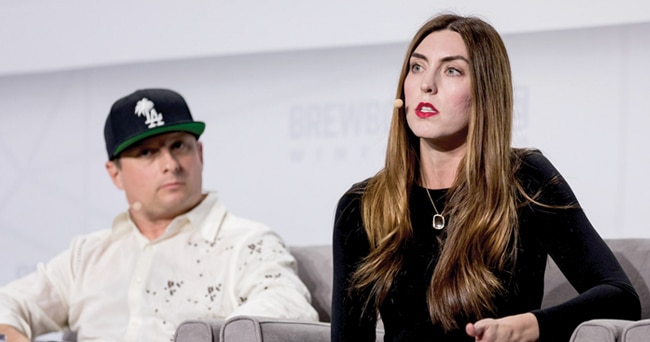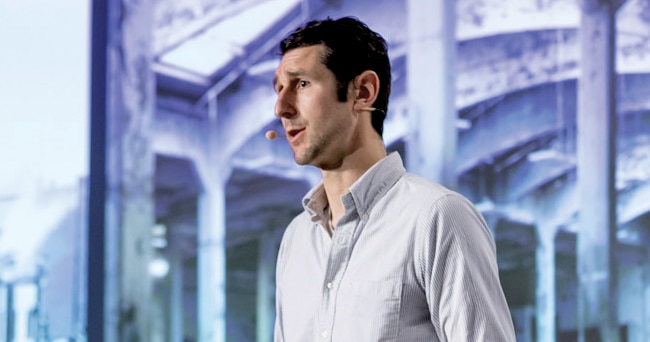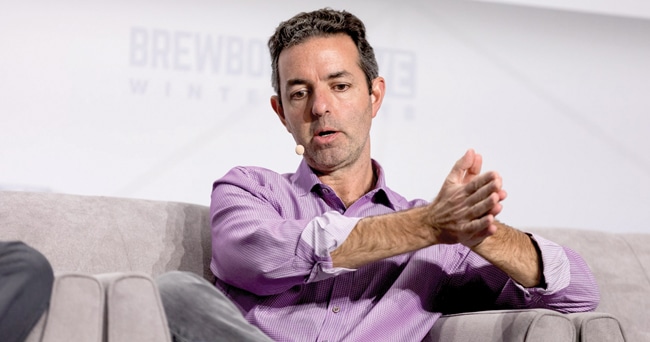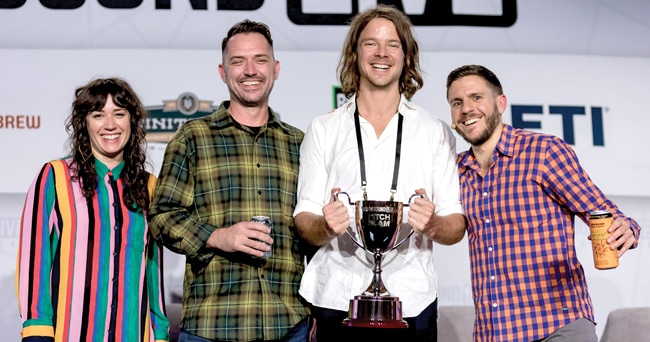Brewbound Live 2018 Examines Cannabis, Company Culture and the Future of Craft
Hundreds of entrepreneurs and executives from across the beer industry gathered at the 2018 Brewbound Live business conference, held in Santa Monica, California, to discuss category health, cannabis and future product innovations.
Craft Brew Alliance CEO Andy Thomas set the tone for the two-day event by asking attendees a simple question on day one: Who is really your competitor?
“If we don’t know who our competitor is, we don’t know how to compete,” he argued. “Do we really know by whom we’re getting squeezed?”
During his keynote address, Thomas told the audience that the prospect of competing against “big pharma” and “big beverage,” as they potentially enter the cannabis space, or begin making non-alcoholic seltzers, worries him more than the idea of competing against other beer companies – or even wine or spirits.
“Meanwhile, we’re off arguing with ourselves over ‘are you a brewer, are you independent, are you whatnot,’” he said.
Thomas added that as the internal strife among beer companies and industry organizations continue, cannabis is increasingly becoming a part of people’s daily lives.
“Whereas we basically demonize and we point a finger at beer becoming more a part of people’s lives because we forget that we’re not competing with each other to make people love beer more, we’re just competing for that occasion,” he said.
Thomas believes that beer companies should avoid “petty battles” or debates over labels as growing threats from outside of the beer category loom, particularly growing consumer interest in cannabis.
“When one out of four of your consumers is starting to do something that’s becoming more available and more legal – either because of the impact on their discretionary income, either because of the impact on their socialization pattern or the impact on where they socialize – I would submit to you all that there is going to be a pretty big impact as that number grows,” he said.
Over the course of the two-day event, that emerging cannabis sector was routinely discussed as a potential threat to alcohol producers.
Jocelyn Sheltraw, the director of regional strategy for Headset, a cannabis data intelligence company, shared retail insights from states where recreational use of marijuana has been legalized.
According to Sheltraw, the average annual spend on cannabis is $375 in states where it’s legal. Compare that to average American household’s total beverage alcohol spend of $435, and cannabis is quickly gaining ground.
Additionally, Sheltraw shared projections that sales of cannabis will surpass beer sales in California – the nation’s top state for beer sales – by 2020. She also noted that sales of cannabis beverages are estimated to hit $50 million in Washington and Colorado by 2021, saying that now is the time to launch a cannabis beverage brand as there are fewer than 100 beverage brands currently available.
Although many brewers are looking to produce cannabis-infused beers, California’s Firestone Walker isn’t one of them. Co-founder David Walker is “not chasing psychoactive potions.”
“We set out to make great beer,” he said, adding the company would release a rosé beer and New England-style IPA in 2019.
Meanwhile, Rhinegeist co-founder Bryant Goulding acknowledged that while the industry is currently focused on the potential impacts of cannabis, future challenges could be the result of a consumer shift away from on-premise retail, or even advancements in artificial intelligence.
“I don’t think behaviorally people are going to get less healthy,” he said. “Right now, it’s yoga and kombucha. I would say, know what you stand for and stick to your guns on that but not to the extent that you can’t accommodate what the market is telling you and what your people are telling you.”
Indeed, brewers large and small are also increasingly watching the health and wellness space. Brooklyn Brewery CEO Eric Ottaway discussed his company’s new non-alcoholic beer, which launched in Sweden earlier this year.
With the launch of its dealcoholized brew, Brooklyn joins an expanding group of major beer companies to enter the non-alcoholic beer space, including Heineken and Pabst Brewing Company.
According to Ottaway, the company is looking to tap into increasing consumer demand for more alcohol-free brews and it is exploring ways to expand beyond beer in the U.S., including through the introduction of more functional beverages.
“We’re opening our minds as to what we can be going forward,” he said.
Ottaway sees a lot of opportunity in the market for non-alc beer, which he believes could eventually capture about 10 percent of the U.S. beer market.
And the timing for non-alcoholic offerings may be right. According to Thomas, 84 percent of global consumers are actively trying to reduce or moderate their alcohol intake.
In addition to plenty of conversations about more functional alcoholic beverage offerings, the 2018 Brewbound Live event also featured discussion around healthy workplaces.
Goulding – who has helped build Rhinegeist Brewing into a 100,000 barrel brewery in just five years, admitted that “growth can be really hazardous to culture.” He said the company actively works to maintain the culture and do-it-yourself spirit of the organization by attempting to strike a healthy work-life balance for its 300 employees, most of whom are in their early thirties.
In service of that goal, Goulding said Rhinegeist hires people who are passionate about beer and share the company’s values. Nevertheless, the company also values differing perspectives because “other perspectives sharpen your own.”
Building and maintaining company culture was among the topics addressed by three fast-growing beer companies – Kentucky’s Braxton Brewing, Vermont’s Lawson’s Finest Liquids and Georgia’s New Realm Brewing – during a panel discussion on the factors that have led to their early success.
Lawson’s Finest Liquors founder Sean Lawson said his company went from three full-time employees to 40 when it opened its a new production facility, taproom and retail store in late 2018. Lawson believes the brewery has essentially entered a new “startup phase,” and it is now focused “meeting demand” without “going overboard.”
Meanwhile, Braxton Brewing co-founder Jake Rouse said even though his company is now one of the largest craft breweries in the Cincinnati area, the competition in the region has intensified to the point that he wonders when the “local” phenomenon will shift from a metro area to a specific city.
“Our brand is playing less well across the river than it was 3½ years ago,” he said.
Superbrew Fields Super Pitch
Although its products don’t contain “negative calories,” Willie’s Superbrew – which uses ingredients like ginger, lemon, pomegranate and acai to make bubbly, gluten-free alcoholic beverages with fewer than 120 calories – emerged as the winner of Brewbound’s 2018 Pitch Slam competition.
The company’s founder and CEO Nico Enriquez beat out seven other emerging craft beverage entrepreneurs who participated in the business pitch competition that was sponsored by Craft Brew Alliance.
Enriquez impressed a panel of judges that included CBA director of innovation Karmen Olson, innovation brewmaster Tom Bleigh, Interact Boulder creative director Fred Hart, Wormtown Brewery managing partner Dave Fields, and OMAC Beverage Advisors managing director Ryan Lake.
According to Olson, Willie’s Superbrew’s brand story, healthy ingredients, and strong packaging design propelled the brand to victory.
In the final round, Enriquez – who rebranded his product from Farmer Willie’s last May – competed against a diverse group of beverage companies, including founders and key executives from electrolyte-infused beer maker Sufferfest Beer Company; hard kombucha maker New Motion Beverages; non-alcoholic craft brewer Athletic Brewing Company; and Minneapolis-based craft brewery Indeed Brewing.
On stage, the judges complimented Willie’s flavor and market positioning. Hart told Enriquez he believed the company was helping boost the need for transparency in the craft beer space.
“I liked that they had the courage to take a risk and rebrand – I think that shows some real commitment to addressing a new category,” Olson told Brewbound after the Pitch Slam. “I also really liked that the need state they’re addressing with this specific product, [which] has a lot to do with permissibility and consumers’ need to feel OK about drinking alcohol.”
With its victory, Willie’s Superbrew won a $10,000 industry awareness package from Brewbound, as well as a trip to Portland, Oregon, for an education and strategy lesson with CBA executives and brewers.


Receive your free magazine!
Join thousands of other food and beverage professionals who utilize BevNET Magazine to stay up-to-date on current trends and news within the food and beverage world.
Receive your free copy of the magazine 6x per year in digital or print and utilize insights on consumer behavior, brand growth, category volume, and trend forecasting.
Subscribe



